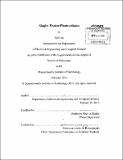Singlet fission photovoltaics
Author(s)
Lee, Jiye
DownloadFull printable version (17.65Mb)
Other Contributors
Massachusetts Institute of Technology. Department of Electrical Engineering and Computer Science.
Advisor
Marc A. Baldo.
Terms of use
Metadata
Show full item recordAbstract
The efficiency of a solar cell is restricted by the "single junction limit," whereby photons with energy higher than the bandgap lose energy by thermalization. Singlet exciton fission splits a high-energy molecular excitation ("singlet" exciton) into a pair of lowenergy ones ("triplet" excitons). In solar cells, it promises to generate two electrons per photon, potentially overcoming the singlet junction efficiency limit. In this thesis, we present singlet-fission-based photovoltaic cells that generate more than one electron per photon. We first demonstrate organic photodetectors with quantum efficiencies reaching 100% by exploiting singlet exciton fission. Through study of the magnetic field dependence of the fission process, we find an optimum thickness of singlet fission layers that guarantees the nearly 100% conversion of a singlet into two triplets. By employing an exciton blocking layer and a light trapping scheme to the solar cell, we demonstrate the peak external quantum efficiency exceeding 100% in the visible spectrum. It is the first time that any solar cell has generated more than one electron per photon outside the UV spectrum. We also build a simple model that predicts the rate of singlet fission through intermolecular coupling, enabling rational designs of singlet fission molecules and devices. Finally, we propose a future direction-generating three electrons per photon. As a step toward this goal, we demonstrate singlet exciton fission in hexacene, whose energetics may allow a singlet to split into three triplets.
Description
Thesis (Ph. D.)--Massachusetts Institute of Technology, Dept. of Electrical Engineering and Computer Science, 2013. Cataloged from PDF version of thesis. Includes bibliographical references (p. 131-151).
Date issued
2013Department
Massachusetts Institute of Technology. Department of Electrical Engineering and Computer SciencePublisher
Massachusetts Institute of Technology
Keywords
Electrical Engineering and Computer Science.